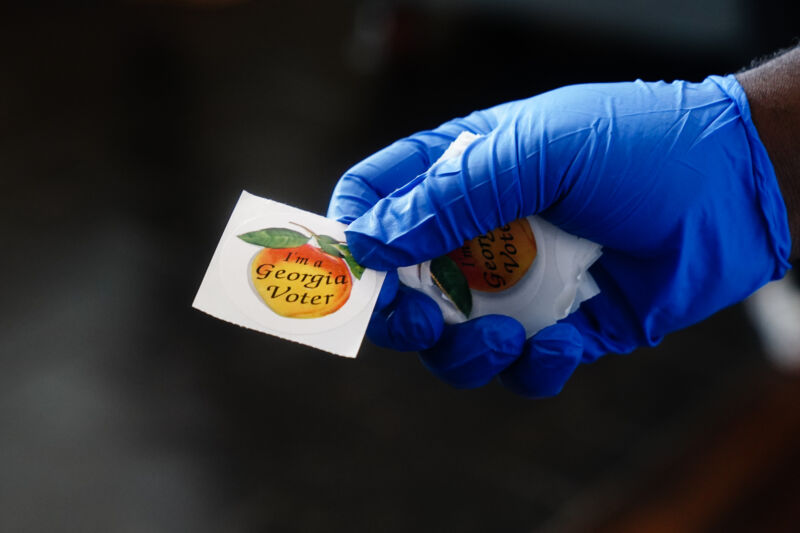EPB SNAFU —
Voting machines aren’t the only digital devices to worry about on November 3.
Timothy B. Lee
–

Enlarge / A polling-place worker holds an “I’m a Georgia Voter” sticker during the primary election on June 9, 2020 in Atlanta.
A federal judge in Georgia has ordered election officials to print paper backups of voter data so that voting can proceed even if the digital system for checking in voters fails. This is a win for plaintiffs who have argued that flaws in Georgia’s electronic-poll-book (EPB) system hampered voting in the June primary and could do so again in November.
Over the last 20 years, a lot of discussion has revolved around the risk that electronic voting machines pose to the security and integrity of elections. But there has been less attention paid to electronic poll books—another digital system that can undermine election integrity if they malfunction.
Pollworkers use EPBs to verify a voter’s eligibility and then check the voter in. Malfunctions in these systems can slow down the voting process so much that some people give up voting altogether. By targeting precincts where most people vote for a particular candidate or party, a hacker could potentially swing a close election just by triggering malfunctions in electronic poll books. And while voting machines are supposed to be kept off the Internet, electronic poll books are often online throughout election day.
There’s no evidence that anyone has deliberately exploited this potential vulnerability in American elections, and maybe no one ever will. But at a minimum, electronic poll books make American elections more complex and brittle. It’s possible that, as with voting machines, the old paper system was actually a better choice.
Georgia’s electronic poll books caused problems
Georgia has long been a battleground in the debate over electronic voting technology. Until last year, Georgia used ancient paperless voting machines that didn’t allow for a meaningful post-election audit. Last year, US District Judge Amy Totenberg ordered the state to switch to a system of paper ballots. In the new system Georgia introduced this year, voters enter votes on a touchscreen ballot-marking machine that then prints out a paper ballot.
This year, along with the ballot-marking machines, the Peach State also introduced a new electronic-poll-book system. The KnowInk Poll Pad is an iPad running custom software that pollworkers use to verify voter eligibility and check voters in.
Problems with these machines aren’t just a theoretical concern. In her Monday ruling—part of the same case that forced an end to paperless voting last year—Judge Totenberg points to numerous examples when EPB glitches created hour-long delays during Georgia’s chaotic June 9 primary
One poll watcher visited a voting location at the Central Park Recreation Center in the Atlanta area. She reported that “the wait time to vote at 10:00 a.m. was estimated at 4 hours. Voting was almost at a complete standstill due to inoperable electronic poll books.” Unable to verify voters’ eligibility, election workers asked voters fill out provisional ballots, which dramatically slowed down the voting process.
A voter in DeKalb County, also in the Atlanta area, reported that “two PollPads were down and no one had voted after waiting for an hour after polls should have opened.” At the Dunwoody Library in DeKalb County, “voters had been waiting over an hour” and “voters were not being checked in because the PollPad equipment was down.”
There’s no evidence that these machines were hacked. By all indications, the problems with EPBs in the primary had more mundane causes like software bugs, networking problems, or inadequate training of pollworkers. But regardless of the cause, the problems with the EPB likely prevented some voters from casting a vote. And Judge Totenberg concluded that that was a big problem.
Electronic poll books need paper backups
To help prevent the repeat of these problems in November, plaintiffs asked Judge Totenberg to order that every precinct have a paper copy of poll-book data. Precinct officials were already slated to have printouts of voter-registration data, but these printouts lacked up-to-date information about who had already cast early votes or requested absentee ballots. Pollworkers need this information to decide whether a voter can cast a ballot. Plaintiffs wanted officials to print out a copy of this up-to-date data in the brief window between the last day of early voting and Election Day.
Georgia officials argued that it would be too burdensome to print out this data for every precinct. But they had few good arguments against making the data available online for local officials to print out themselves. So that’s what Judge Totenberg ordered.
Georgia isn’t the only jurisdiction that has suffered EPB problems. Voters in Los Angeles experienced long lines during the March primary election in California, and a subsequent investigation pointed to problems with new electronic poll books as a major culprit. In 2018, problems with EPBs caused problems in South Dakota, Philadelphia, and Indiana’s Johnson County.
So it would be wise for any jurisdiction relying on electronic-poll-book software—and there’s a lot of them—to make sure to have a paper backup on hand at every polling location.

